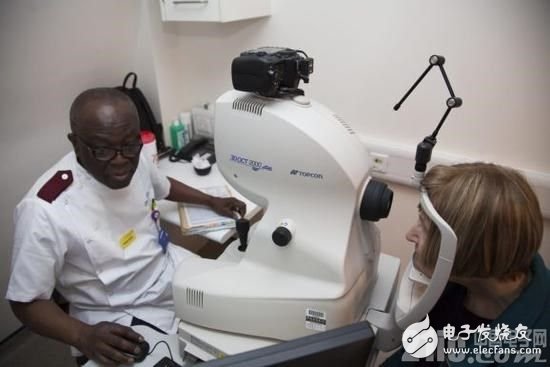Google develops a new AI system that can recommend treatment options with an accuracy rate of 94% for more than 50 eye diseases
According to VentureBeat, the artificial intelligence (AI) system jointly created by Google’s DeepMind Health, Moorfields Eye Hospital NHS Trust Fund and University College London Eye Institute can recommend treatment options for more than 50 eye diseases with an accuracy rate of 94%. Top human experts are on par.

In a study published in the online edition of the journal Nature Medicine, the researchers detailed the progress made by AI in the treatment of eye diseases. The British "Financial Times" first reported in February 2016 that AI can be used to analyze the largest eye diseases (such as glaucoma, age-related macular degeneration, diabetic retinopathy), etc., and may be more accurate than well-trained human experts .
Neural networks trained to find patterns in images are also used to detect cardiovascular disease, breast cancer, and kidney disease. Dr. Pearse Keane, a scientist at University College London, said: “The AI ​​technology we are developing is to prioritize patients who need urgent treatment by doctors or ophthalmologists. If we can diagnose and treat eye diseases early, we will There is the best chance to save people’s eyesight."
Through further research, this may lead to higher quality of care for patients with eye diseases in the future. The system can not only give treatment recommendations, but also explain why doctors choose to make specific recommendations and show the level of confidence in the recommended treatment process. The idea of ​​sharing the rationale behind the recommendations is consistent with the claims of Google AI director Jeff Dean, and he hopes to see more similar attempts. AI can also be deployed on a variety of medical imaging equipment, which can be used to generate medical images of the eye.
However, the AI ​​system must undergo clinical trials and obtain regulatory approval before being used in daily eye scans. A DeepMind spokesperson pointed out that if the clinical trial is successful, Moorfields will be able to use the AI ​​system for free in its 30 hospitals and community clinics in the UK, with an initial period of 5 years.
In recent years, with the rise of machine intelligence, AI under development (such as systems developed by DeepMind and partners) is often advocated as a democratized AI that provides patients with the benefits of highly accurate algorithms. According to statistics from the World Health Organization, more than 250 million people worldwide suffer from visual impairment or blindness. The eyes may be the windows of the soul, but they may also be the windows of more serious diseases. For example, diabetic retinopathy is associated with an increased risk of cardiovascular disease.
The neural network created by Google can predict with about 70% accuracy whether patients with diabetic retinopathy will continue to experience major heart events such as heart attacks. This spring, Google CEO Sundar Pichai (Sundar Pichai) and the Google Medical Brain team said that the company has created an AI system that can predict whether a patient will be hospitalized again. The results announced in June this year also found that in a trial at two hospitals, this AI system can predict whether a patient will die during hospitalization with an accuracy rate of over 90%.
Alphabet subsidiary Verily Life Sciences has also been very active this year, dedicated to solving some problems, such as sleep apnea detection, the use of AI to help drug discovery, blood collection, health insurance, etc.
Nanning Goodman Technology Co.,Ltd , https://www.goodmentech.com